The Lie about the Long Lived Japanese People (Patreon)
Downloads
Content
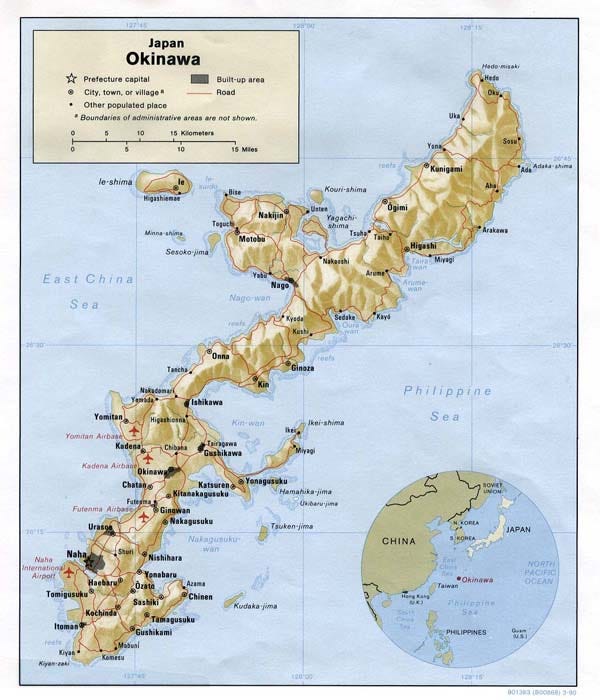 </figure>
</figure>The people of Japan’s beautiful Okinawa are claimed to be the longest lived people in the world. Okinawa was well known at one point for having the highest average lifespan and the most centenarians.
<figure>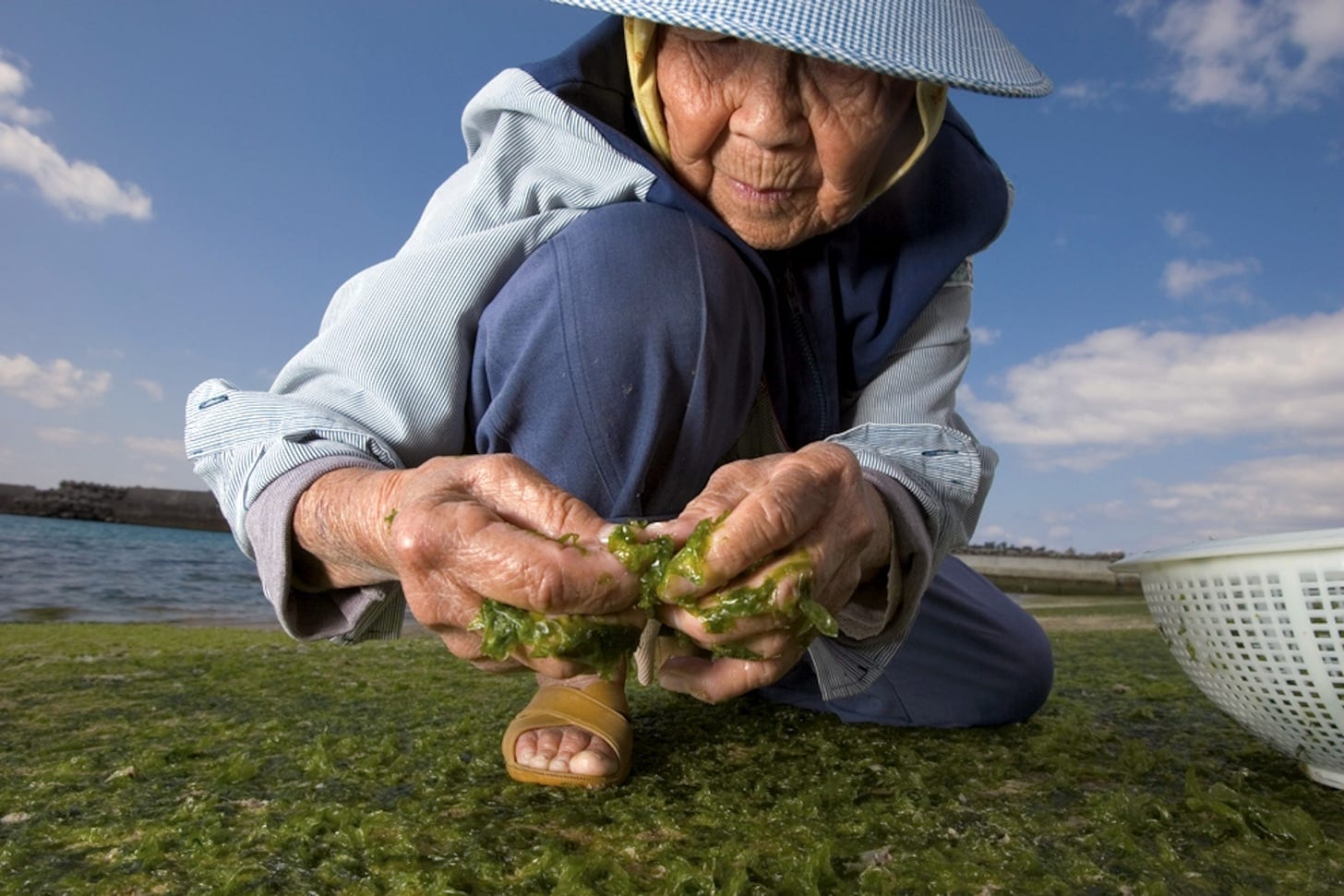 </figure>
</figure>Here is their diet.
<figure>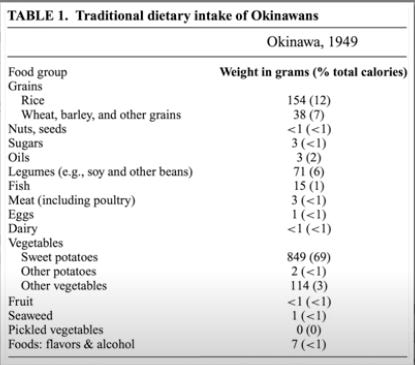 </figure><figure>
</figure><figure>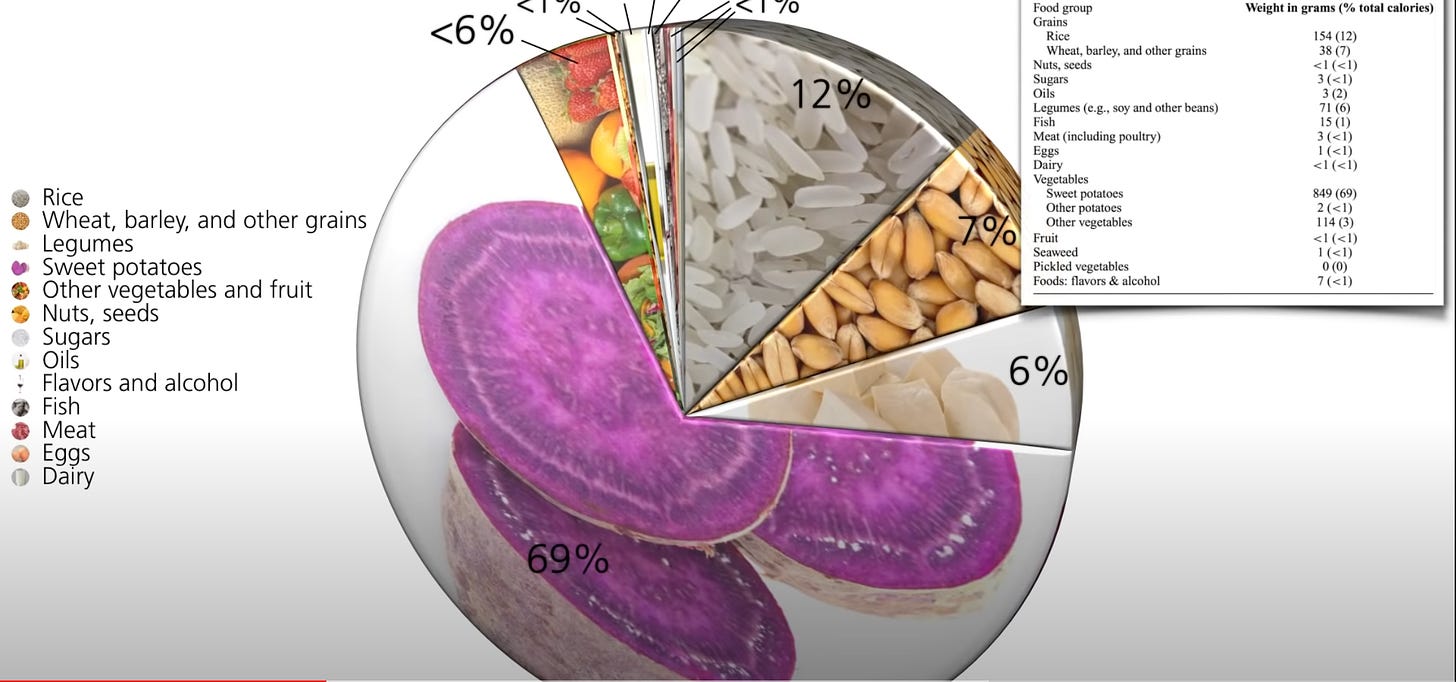 </figure>
</figure>…Wait a minute, does anything seem weird about this to you?
The traditional diet of the people of the ISLAND of Okinawa are apparently only getting 1% of their calories from fish.
Did Okinawans live long because they ate a protein-deficient, sweet potato based diet?
In 1945, the bloodiest battle of the pacific took place in Okinawa, Japan. A third of the population died and due to widespread destruction which included destruction of the food supplies, a huge number of civilians were left starving and struggled to scrape together an adequate diet after the war. Without much else to eat, many Okinawans relied on a resilient crop for calories - sweet potatoes.
<figure>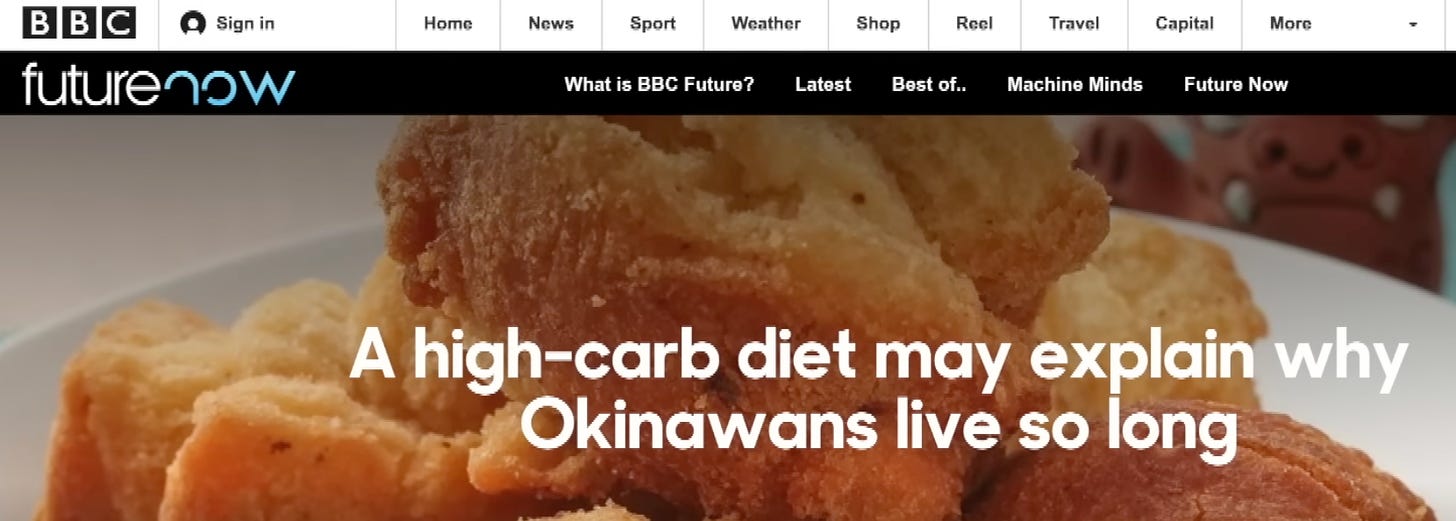 </figure>
</figure>74 years later in 2019, a BBC article came out titled A high-carb diet may explain why Okinawans live so long. The article was based on a 2016 study that explained that various experiments found a low protein high carb diet to make lab animals live longer. They claim the Okinawans likely lived so long because the carbohydrate content of their diet was 10 times the protein content, which is a remarkably similar ratio to that of the long-living lab animals. They call this 10:1 carbs to protein ratio the ‘Okinawan ratio.’
As someone who has been to many Okinawan restaurants in Tokyo as well as restaurants in Okinawa that offer up all sorts of pork dishes including pig feet and pig ears, this characterization of the diet didn’t make sense to me.
Here’s the thing - those researchers deduced the composition of the Okinawan diet based on a single snapshot in time - a data point from 1949. This was only 4 years after the war, which left Okinawans with barely anything to eat except sweet potatoes. I’ve heard this ‘Okinawans eat tons of purple sweet potatoes’ narrative on multiple occasions, usually in support of a plant-based diet. Michael Greger, who is usually the go-to guy for pro-vegan data, presents the narrative in this video of his.
“…but a more accurate representation would be this. If you look at their actual dietary intake, we know what they’re eating from the U.S. National Archives because the U.S. military ran Okinawa… and if you look at the traditional diets of more than 2000 Okinawans, this is how it breaks down. Only 1% of their diet was fish. Less than 1% of their diet was meat and same with eggs and dairy. So it was more than 96% plant-based. …The Okinawan diet was centered about purple and orange sweet potatoes. How delicious is that?”<figure>
 </figure>
</figure>By definition, centenarians live to be over 100 years old. Are we to expect that they ate the same diet for 100 straight years? Or even say 60 years? Further, should we expect that they would decide to stick to a paltry sweet potato diet that was a product of the destruction of the war?
At one point while I was studying at a Japanese University, I ran out of money and was on a shoestring budget until the the next scholarship payment came in. I tried to find foods that provided plenty of protein and calories for cheap. For 3 days my diet was basically a big carton of milk and a big bag of shelled peanuts. If those same researchers happened upon me at that particular time, maybe there would be a BBC article titled A High-Peanut, High-Milk diet may explain this Youtuber’s success.
As I’ve already discussed in another Substack, a low-protein diet really is not a recipe for a long-lived life. In fact, the elderly need much more protein and amino acids than younger people. Several negative health consequences come from the sarcopenia (muscle wasting) as they experience as they get older, and to top it off, it is much harder for them to build muscle because their muscles develop anabolic resistance, and their gut isn’t as effective at digesting protein. So, animal proteins should be prioritized as they are considered “high quality” proteins because they have more essential amino acids and are more easily digested than plant proteins.
<figure>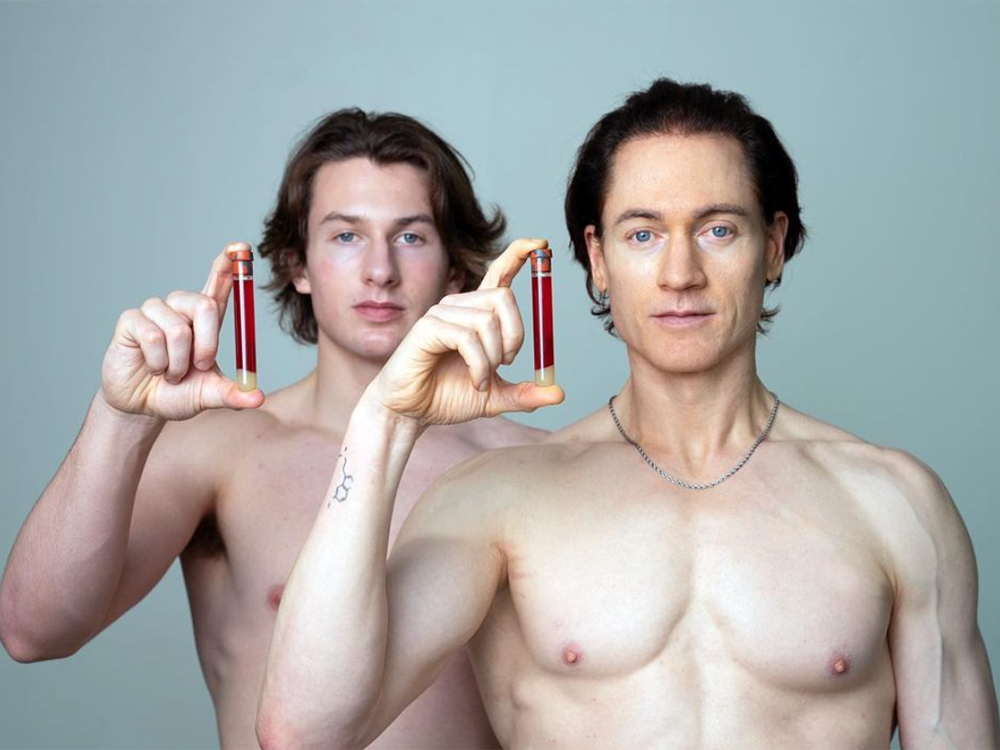 </figure><figure>
</figure><figure> </figure>
</figure>Bryan Johnson, the so-called ‘rejuvenation athlete’ who is spending millions of dollars to try and live long as possible, apparently does not subscribe to this frailty-inducing ‘Okinawan ratio.’ His carb to protein ratio of about 3:2 is nothing like the so-called Okinawan ratio of 10:1.
As discussed before, the idea behind lowering protein intake is to lower mTOR activation so you can live longer. But again, tons of things activate mTOR. Those purple sweet potatoes are surely activating mTOR because carbohydrates activate mTOR. It’s well known that mTOR is activated by insulin, which is secreted when you eat carbohydrate. Leucine is one of the amino acids said activate mTOR, but according to this paper, insulin activates mTOR at least as much as leucine. On that note, Bryan Johnson supplements every morning with the specific amino acids Dr. David Sinclair says would need to be limited to make you live longer by preventing mTOR activation.
<figure>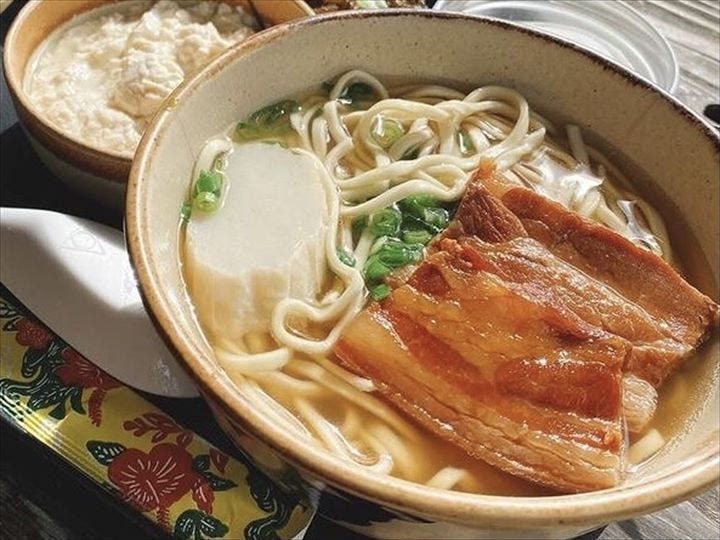 </figure><figure>
</figure><figure>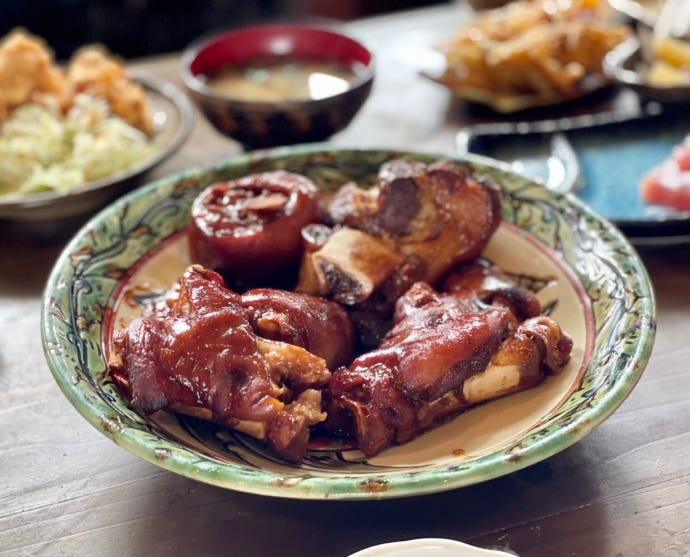 </figure>
</figure>So here’s the thing about the Okinawan centenarians - it’s very doubtful that their diet throughout their life revolved around sweet potatoes except for the few years right after the war when they were still struggling to get enough to eat. As the Okinawan prefectural website says: “Okinawan food begins and ends with pork.” Go to any Okinawan restaurant and it will be filled with pork dishes, including things like pig ears and pig feet.
<figure> </figure>
</figure>Historically, Okinawans prided themselves on their massive pork population which reached 110,000 pigs - that is 1 pig for every 6 people before World War 2. The devastation of the war decimated the pig population, cutting it down almost 90% to just 14,000. In fact, there is a memorial called “The pigs came across the sea” commemorating the Hawaiians generous contribution of 550 pigs to help rebuild the pig population in Okinawa.
<figure>“Across the sea, connecting hearts and lives.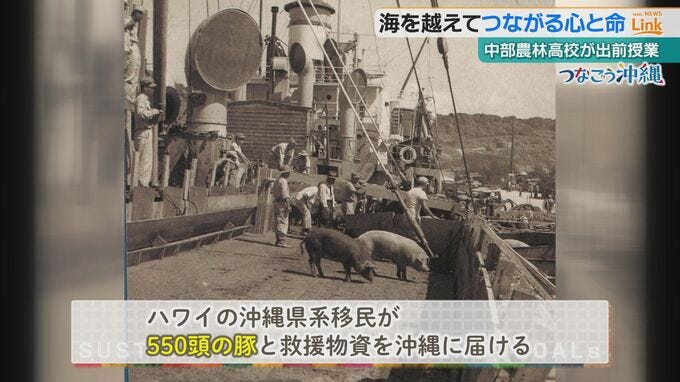 </figure>
</figure>Kids do school reports on this event and there was even an Okinawan musical about the pigs that saved Okinawa. Just 14 years after the war, the Okinawan pig population surpassed its previous high reaching 142,000 in 1960.
Again, restricting protein leads to frailty. Eating more protein allows for greater preservation of muscle mass. A 2022 Meta-Analysis including 57 different studies found that muscle wasting was associated with a significantly higher risk of death. It’s well known that having more muscle mass generally makes people live longer. This paper establishes muscle mass as an independent predictor of survival.
In fact in 2005, Okinawa went from the #1 longest lived prefecture to #26. Okinawan Doctor, Nobuyuki Watanabe claims that the secret to Okinawan’s health in the past was their valuing pork and eating all parts of the pig with some dishes even including pig blood. He claims this was the reason they lived longer than the rest of Japan and says that now Okinawans eat far too many carbohydrates.
<figure>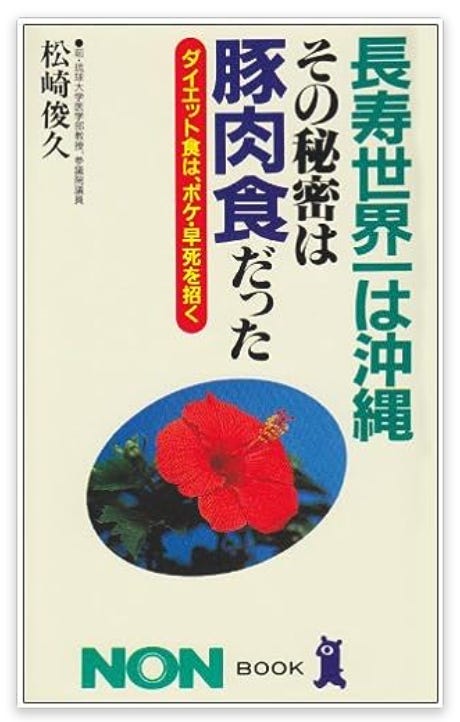 </figure>
</figure>Dr. Shunsuke Matsuzaki pointed out in his 1992 book that it’s kind of weird to focus just on Okinawa since all of Japan is very long lived.(S) He specifically points out that the reason the Japanese came to live so long was because their diet slowly incorporated more and more animal protein as they recovered after the war, reaching 13 times the amount before the war. He says a low protein diet is a recipe for an early death. He points out that if you compare the longest lived prefecture in Japan to the shortest lived, you’ll see that the longest lived ate much more protein. Further, he says the reason the Okinawans live so long is their valuing of pork, which bumped their animal protein intake up to 90grams a day, compared to Japan’s overall average of just 70 to 80grams per day.
<figure>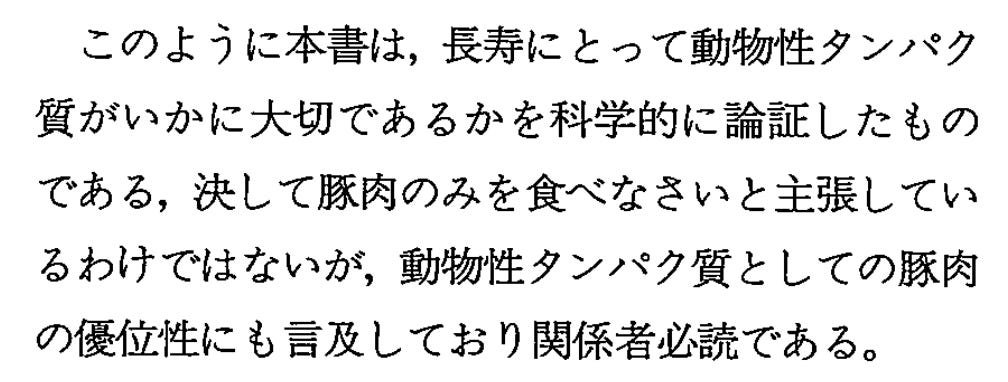 </figure>
</figure>“The book presents that it is scientifically evidenced that animal protein is highly important for longevity. The book does not necessarily say pork must be eaten, but that pork is a good source of animal protein.”
According to the 2016 book Meat’s Health Power「食肉の健康パワー」, centenarians were eating twice as much fish, meat, eggs and soy protein than the average person over age 20.
<figure>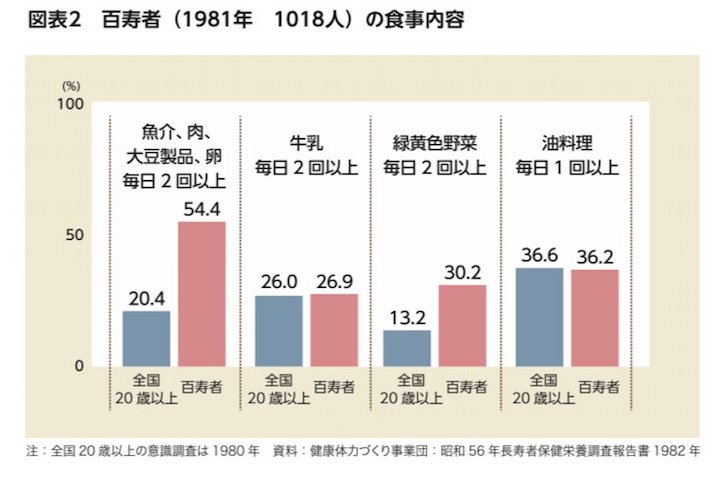 </figure>
</figure>Again, protein quality is important. As discussed in my Protein is not protein video, animal proteins all reach the “high-quality” protein ranking because they provide plenty of each amino acid and are easily digested. Whole plant proteins generally have much lower protein quality scores because they have less of each amino acid in a worse balance and they are less well digested. Further, the elderly experience a decline in stomach acid (hypochlorhydria) which means it is also harder for them to digest protein in general so protein quality becomes even more important.
Dr. Shunichi Kimura wrote in his 1988 Book Meat and Health 「食肉と健康」that Okinawan people eat a ton of protein. He was doing a survey of 100 year old Okinawans and said the the 100 year old Okinawans were eating 3 times more pork than the Tohoku region where Dr. Kimura is from.
<figure> </figure>
</figure>A 1992 study out of the Tokyo Metropolitan Institute of Gerontology came to the complete opposite conclusion to that 2019 BBC Headline saying Okinawans lived long because of carbs (which again, was based on that 1949 data point). The 1992 study showed the Japanese people that lived the longest ate more protein and less carbohydrate. In specific, they ate much more animal protein.
<figure>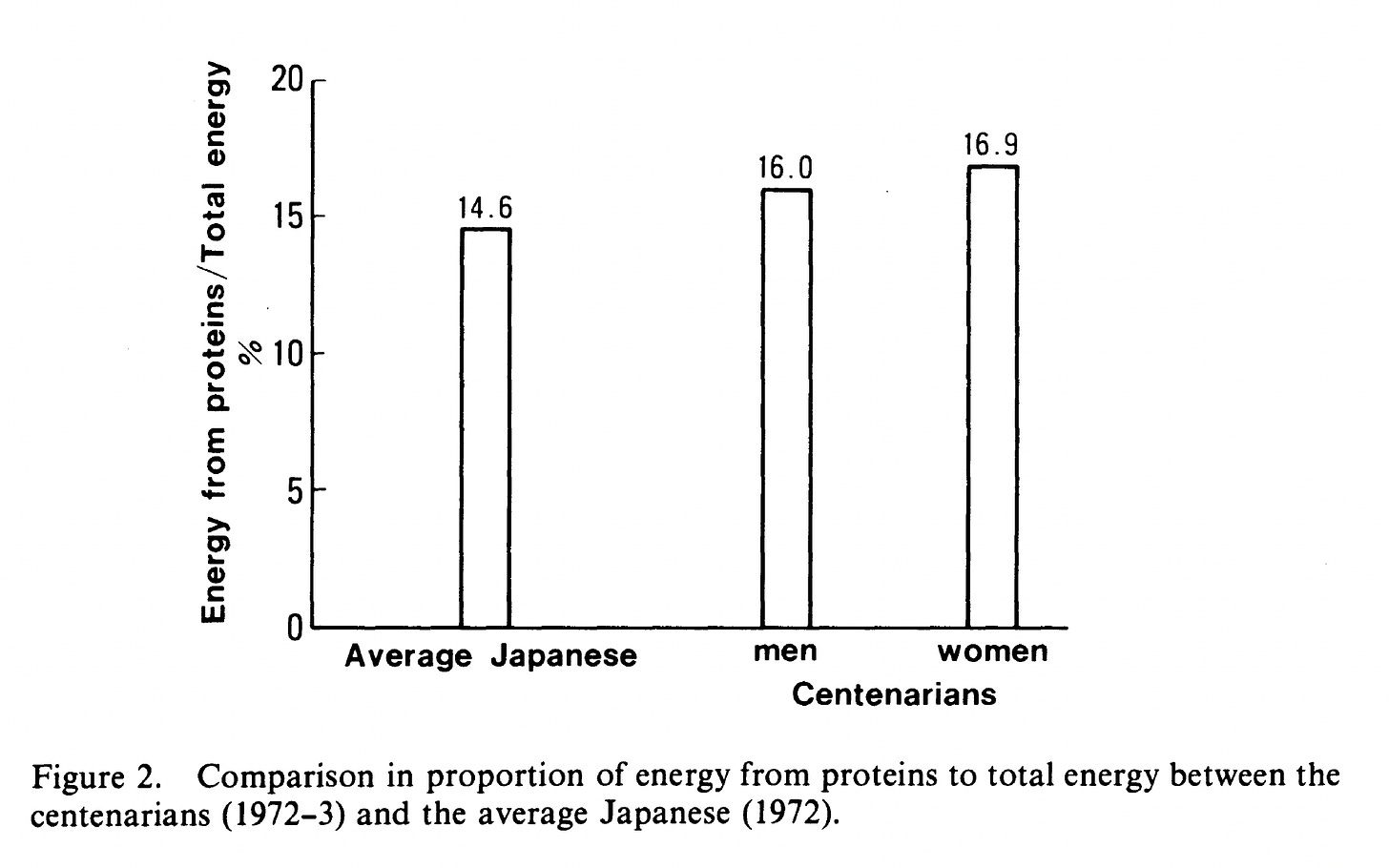 </figure><figure>
</figure><figure>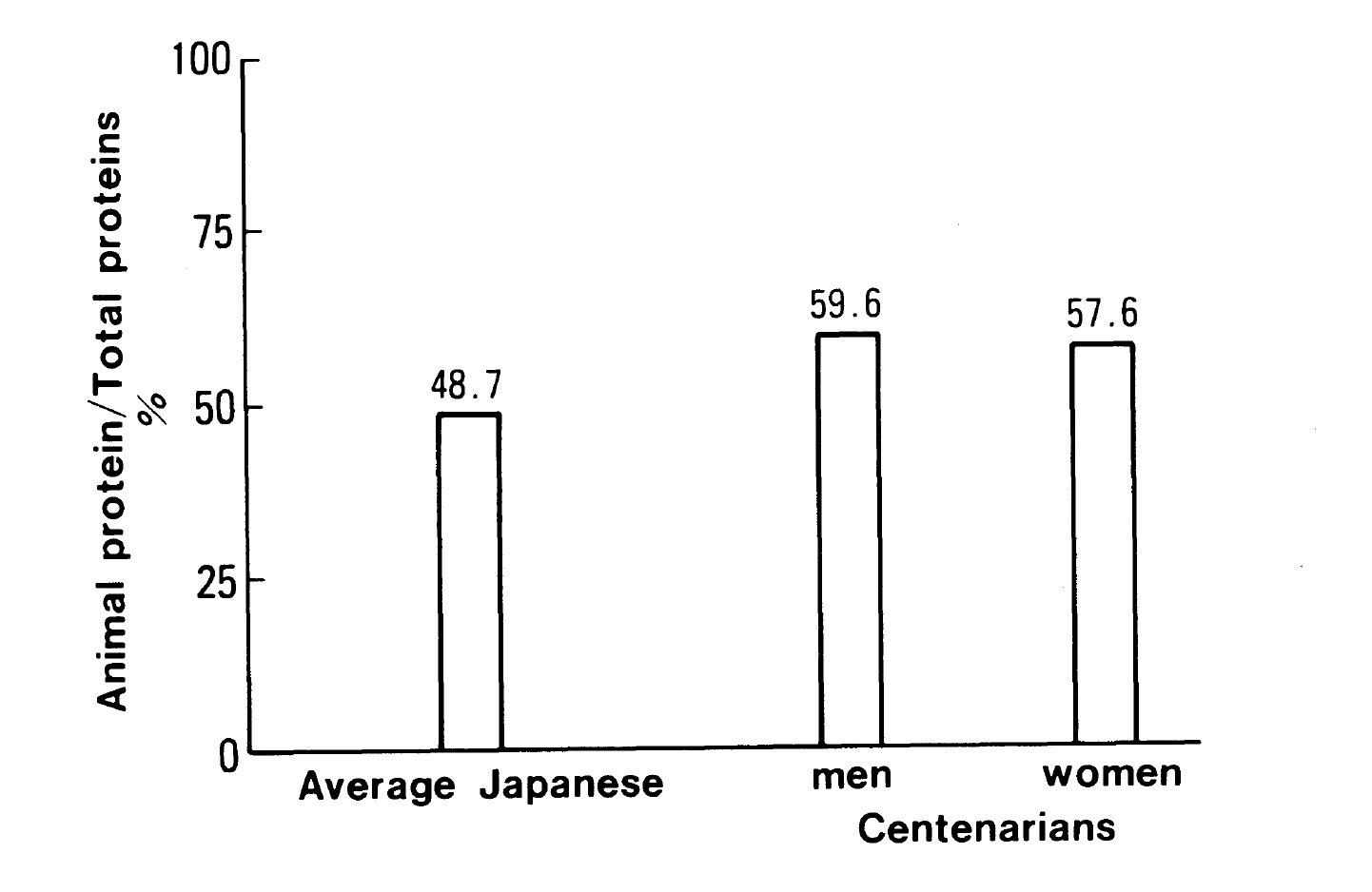 </figure>
</figure>94 Japanese centenarians ate “a higher proportion of animal protein to total proteins than” average. Looking at 422 Japanese people over a 10 year period, those that ate more eggs, milk, fish and meat lived longer. They specifically note that people from Okinawa, the longest lived prefecture at the time ate much more protein and fat and less carbohydrate than the shortest lived precture, Akita.
<figure>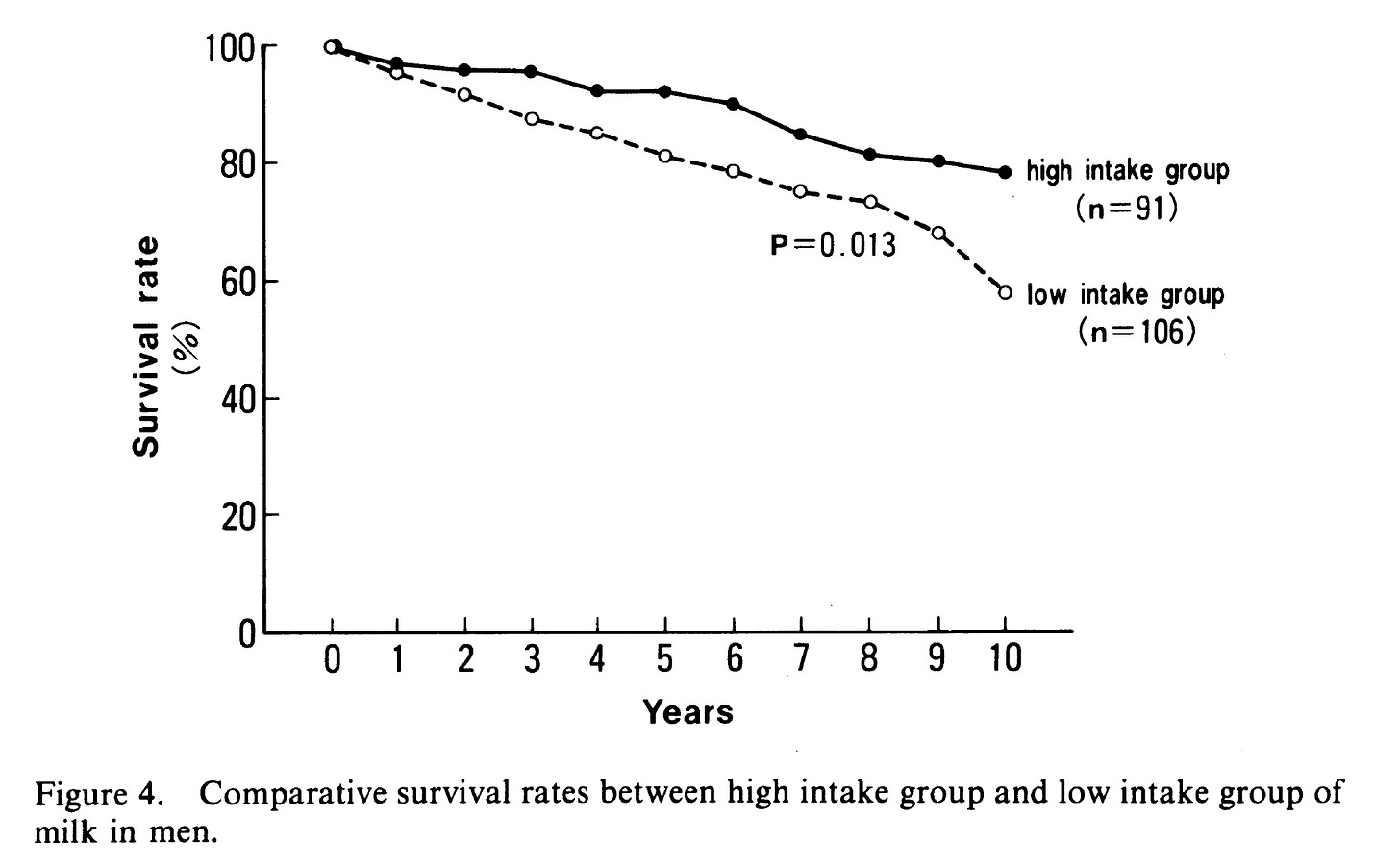 </figure>
</figure>While serum albumin isn’t the strongest marker for total protein intake, there’s data suggesting it is a good marker for animal protein intake. The elderly from the high-longevity Okinawa had much higher serum albumin than people from Akita, the prefecture with comparatively low longevity.
<figure>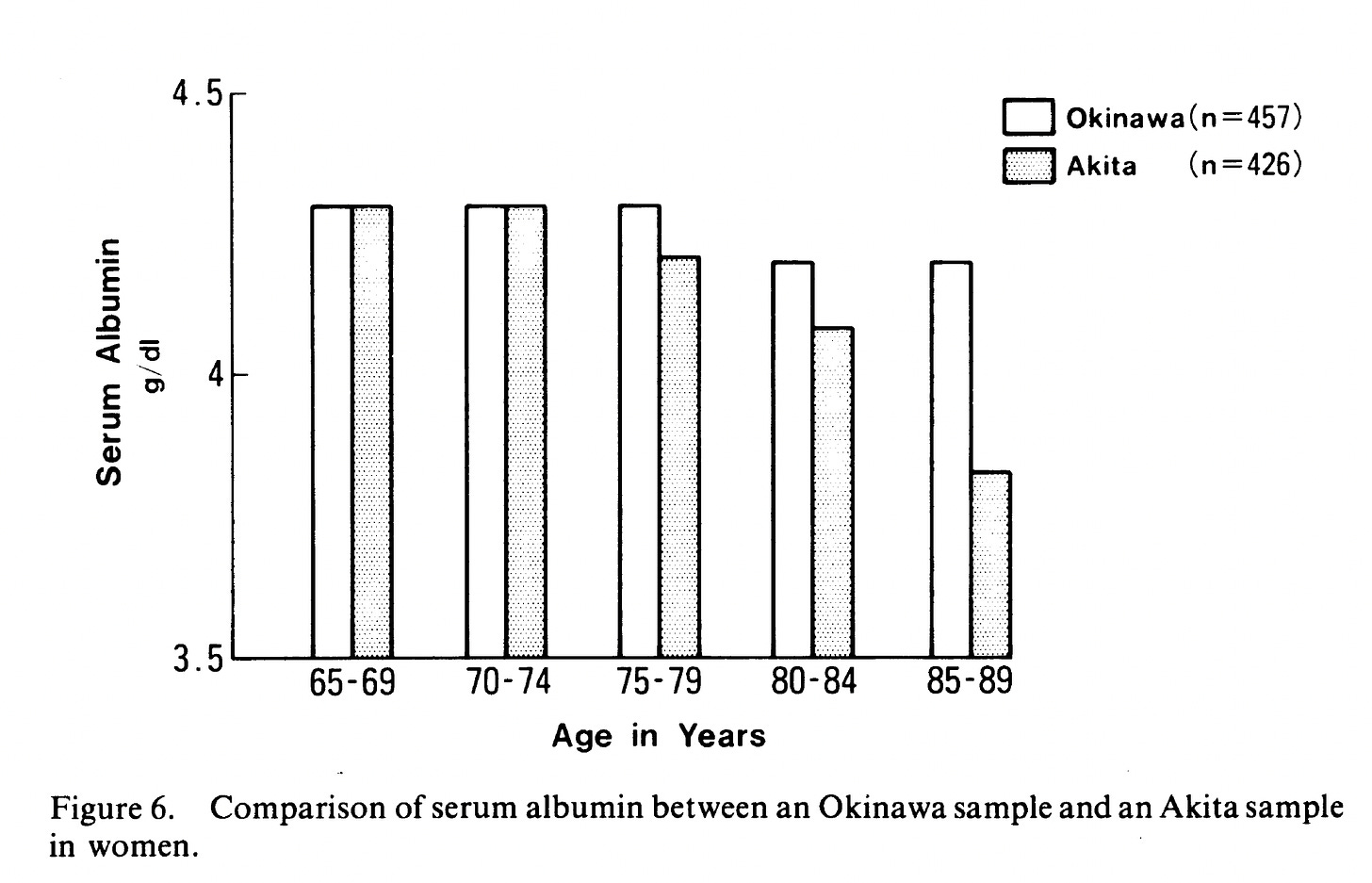 </figure>
</figure>The author of the earlier mentioned Meat’s Health Power said that his research in the Akita prefecture found that milk but more so red meat would raise albumin. He talks about the likelihood of living to 70 lowers as your albumin lowers. Then, the lower your albumin, the more likely you are to have dementia and heart disease.
Further, he notes that data from from Akita, Nagano, Kouchi, Fukuoka, and Oosaka found you’re more likely to have a stroke the lower your cholesterol is. The 1992 study Nutrition for the Japanese Elderly found that Okinawans had much higher cholesterol than people from Akita.
<figure>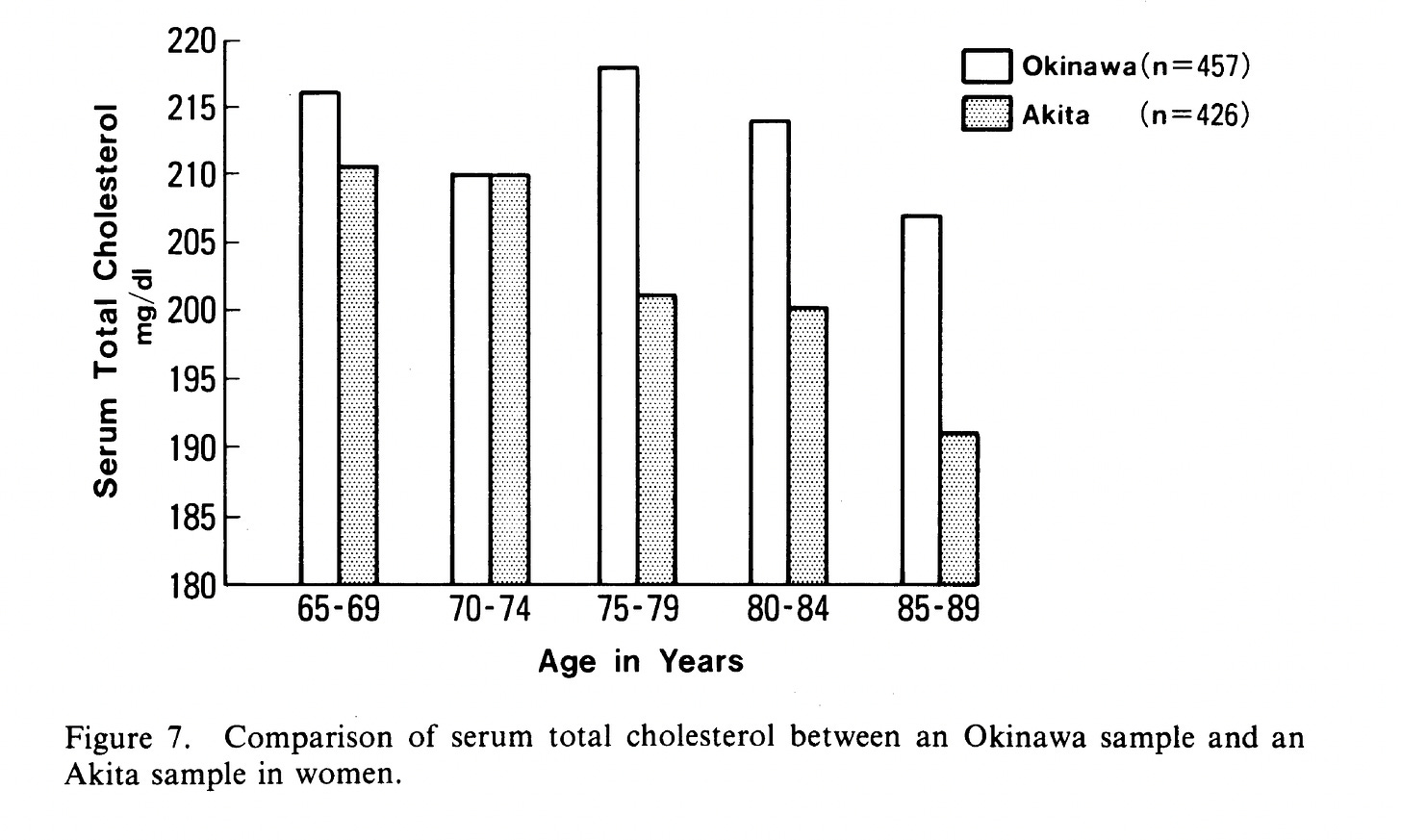 </figure>
</figure>In fact, a 2021 study called this entire ‘Blue Zone’ diet narrative into question. Their data looking at 175 different populations found that more meat intake was associated with higher life expectancy.
So then why do Okinawans live so long?
<figure>Comment on my video “Why is Nutrition Science so Complicated?” where I briefly mention the Okinawan sweet potato myth. </figure>
</figure>A Japanese program investigated the lifestyles of the people in Okinawa’s longest lived village, Oogimi.
100歳が普通!?世界屈指の長寿地域「沖縄・大宜味村」の秘密とは?いきがいのヒントに迫る (“100 Years old is normal? What is the secret of Okinawa’s Oogimi village? A hint to the reason for living.”
The program barely spoke about diet. They discussed things like:
・Not taking people’s independence any more than is necessary. For example, one woman was talking about how having a car was no good because then it depleted her need to walk.
・Having a lifestyle that requires being active (rather than being active because they hear it’s healthy for them). In Oogimi, it’s normal to grow your own food and eat it which requires you to get outside and use your muscles to tend to your garden.
The main thing the program focused on was the importance of community.
<figure>There are 193 people in Oogimison over 90 years old. There are 20 people over 100 years old.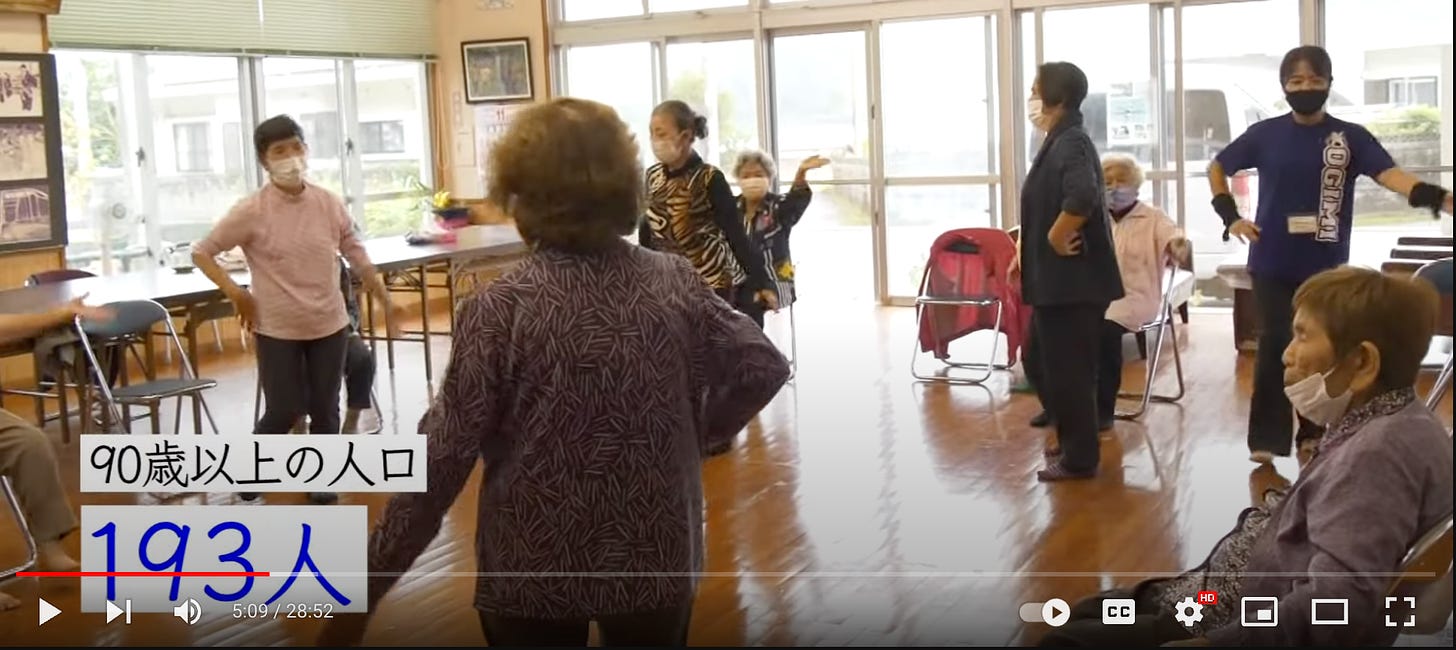 </figure><figure>104 year old: “Even though my ears don’t work so well, just seeing people’s faces gives (me) a drive to live.”
</figure><figure>104 year old: “Even though my ears don’t work so well, just seeing people’s faces gives (me) a drive to live.”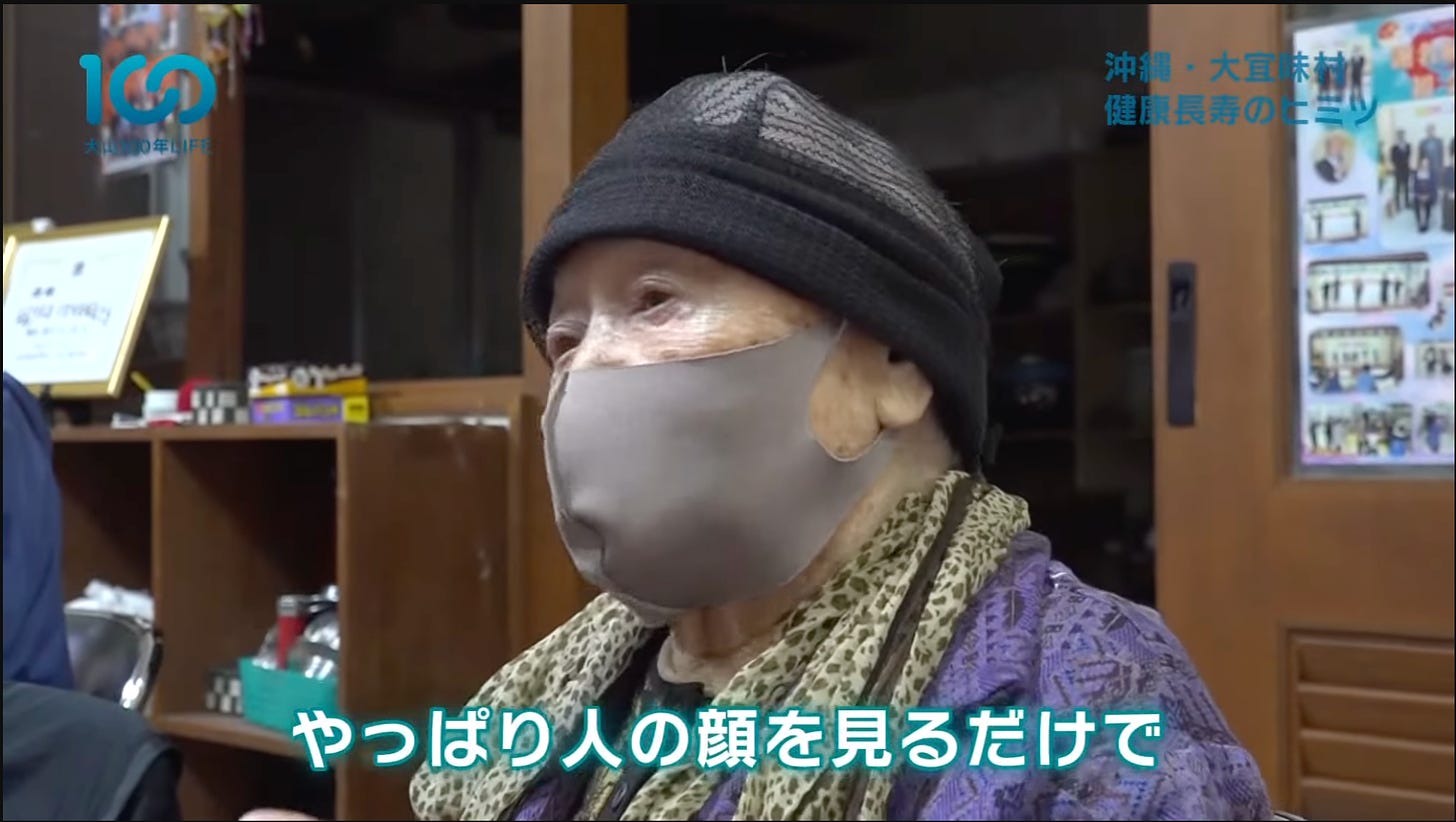 </figure><figure>When people go to the corner store to buy something, there’s a chair next to the register so they can sit down and chat. Sometimes a single purchase turns into a 30 minute chat.
</figure><figure>When people go to the corner store to buy something, there’s a chair next to the register so they can sit down and chat. Sometimes a single purchase turns into a 30 minute chat.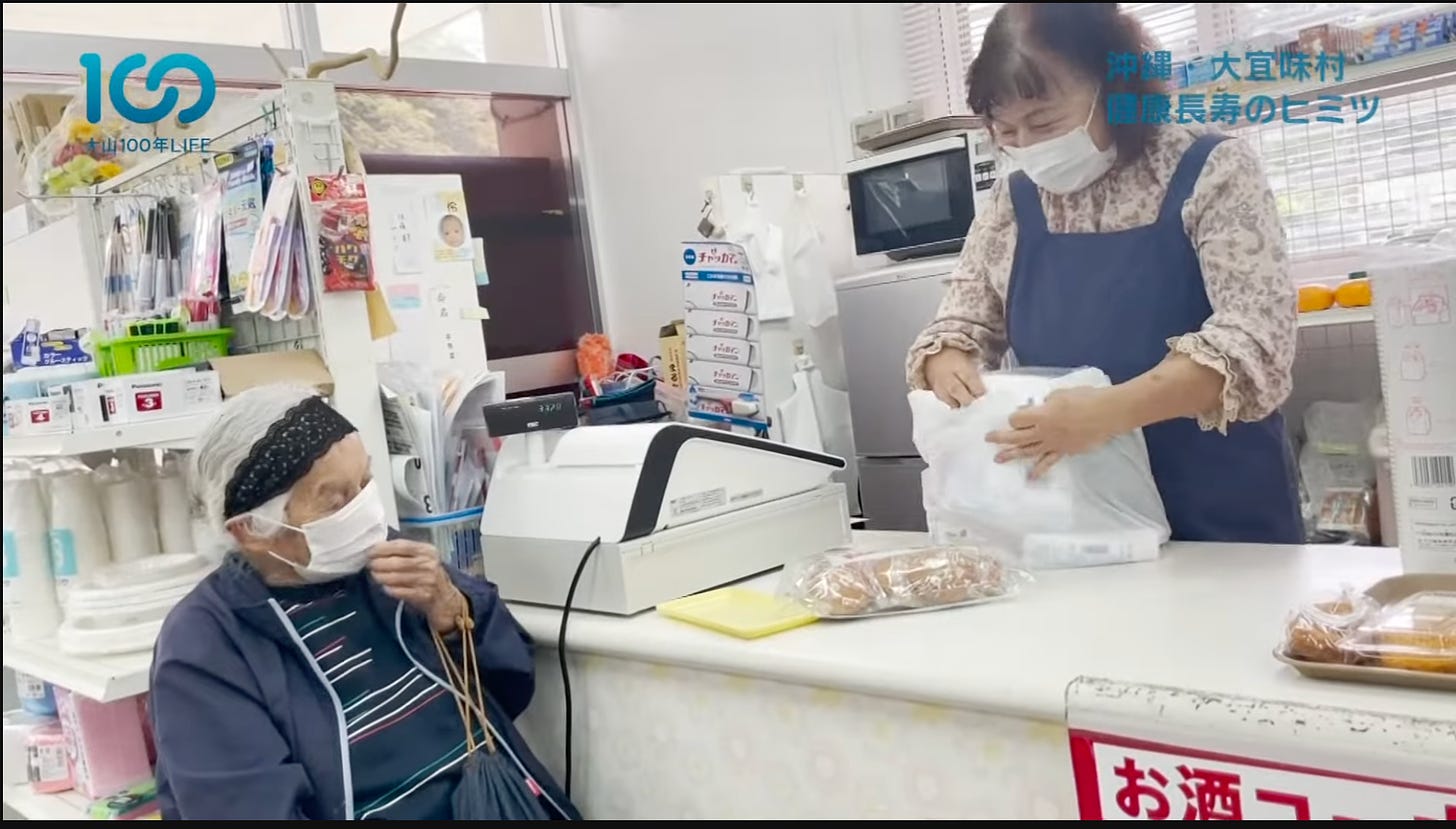 </figure>
</figure>There are a lot of tables and chairs set up throughout the village so people can engage in yuntaku. In Okinawan dialect, yuntaku just means ‘(connection through) chilling and chatting.’
<figure>Some bros hanging out and fixing one of the dude’s piece of fishing equipment.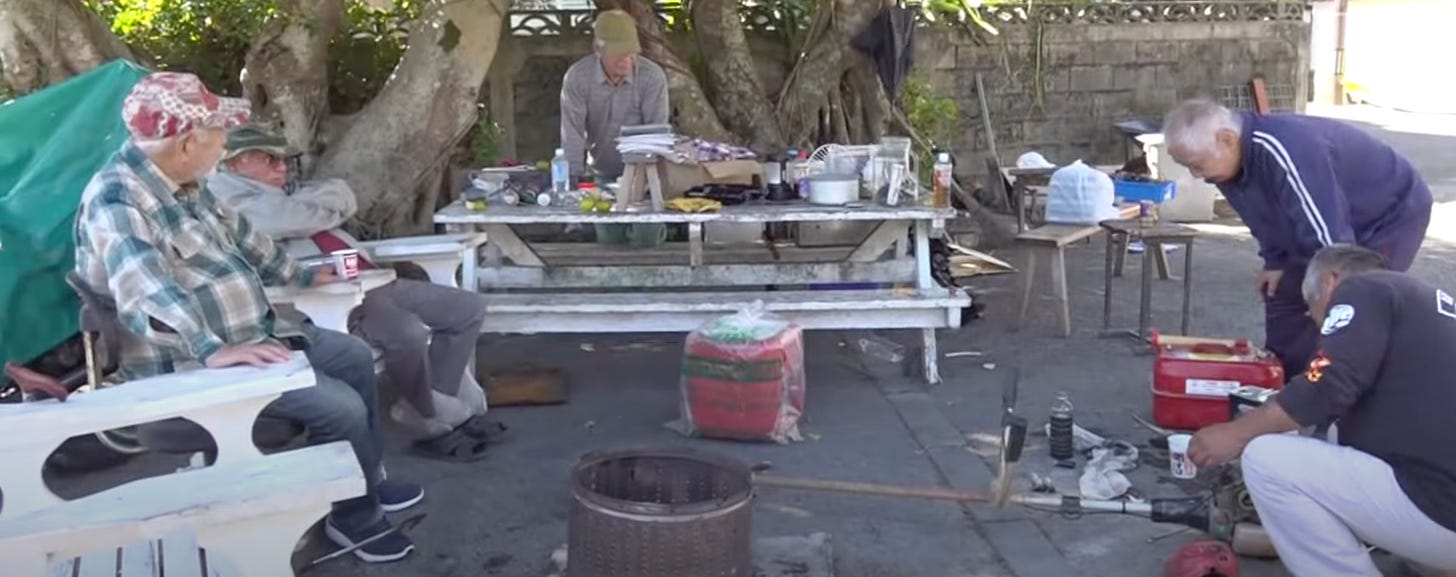 </figure>
</figure>Having a role and being needed
<figure>“Feeling needed is a big source of happiness.”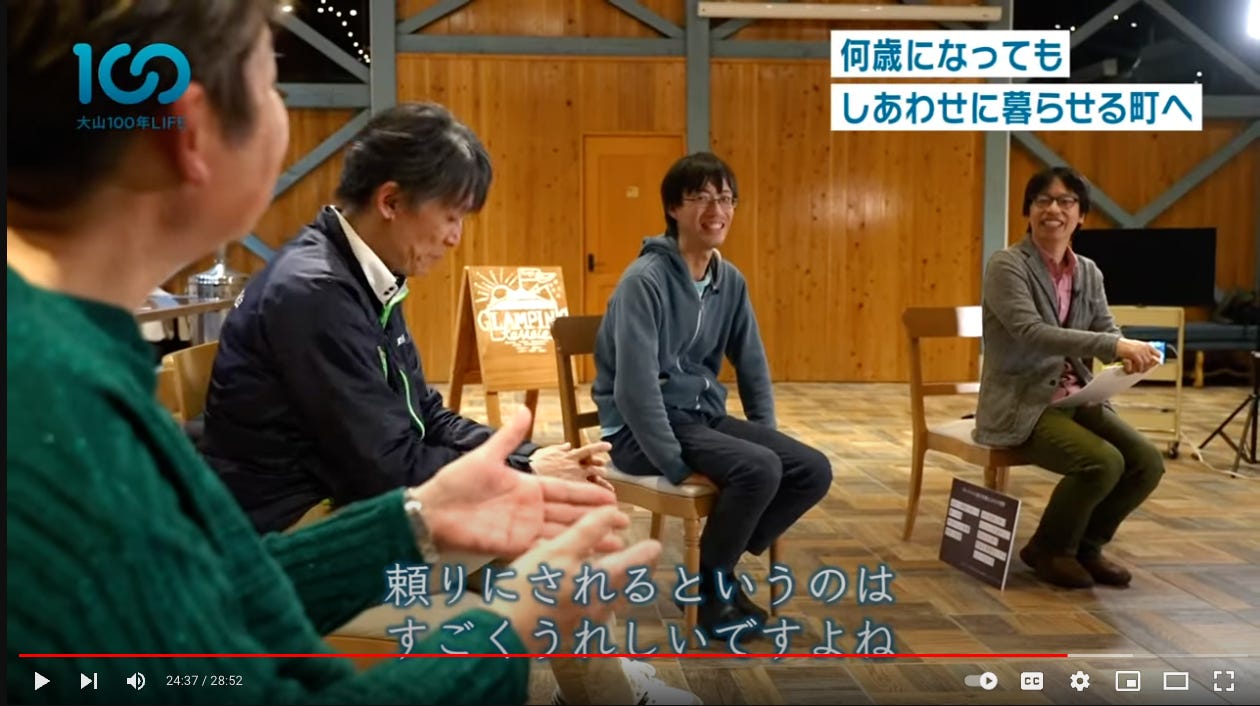 </figure>
</figure>Another word that showed up in the program is yuimāru. Yuimāru is basically the culture of helping others but also relying on each other.
<figure>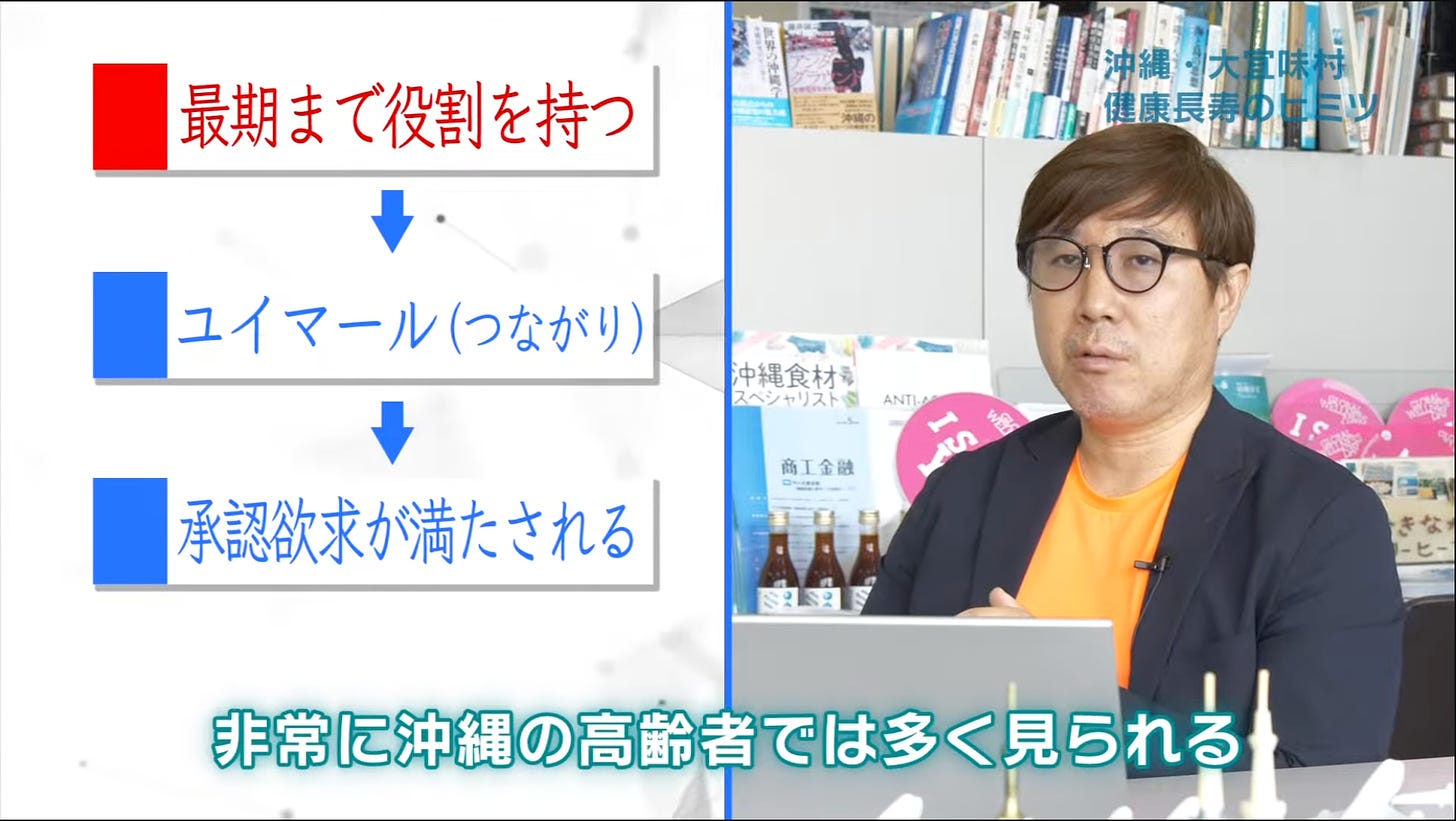 </figure>
</figure>Professor of Regional Development Studies at Ryuukyuu University in Okinawa, Masashi Arakawa says that it is very important to have a ‘role’ (in the community) until the end of their lives. A role indicates that people require what you have to offer, you can participate in yuimāru and through this you satisfy the natural desire to be recognized (as a part of the community.)
<figure>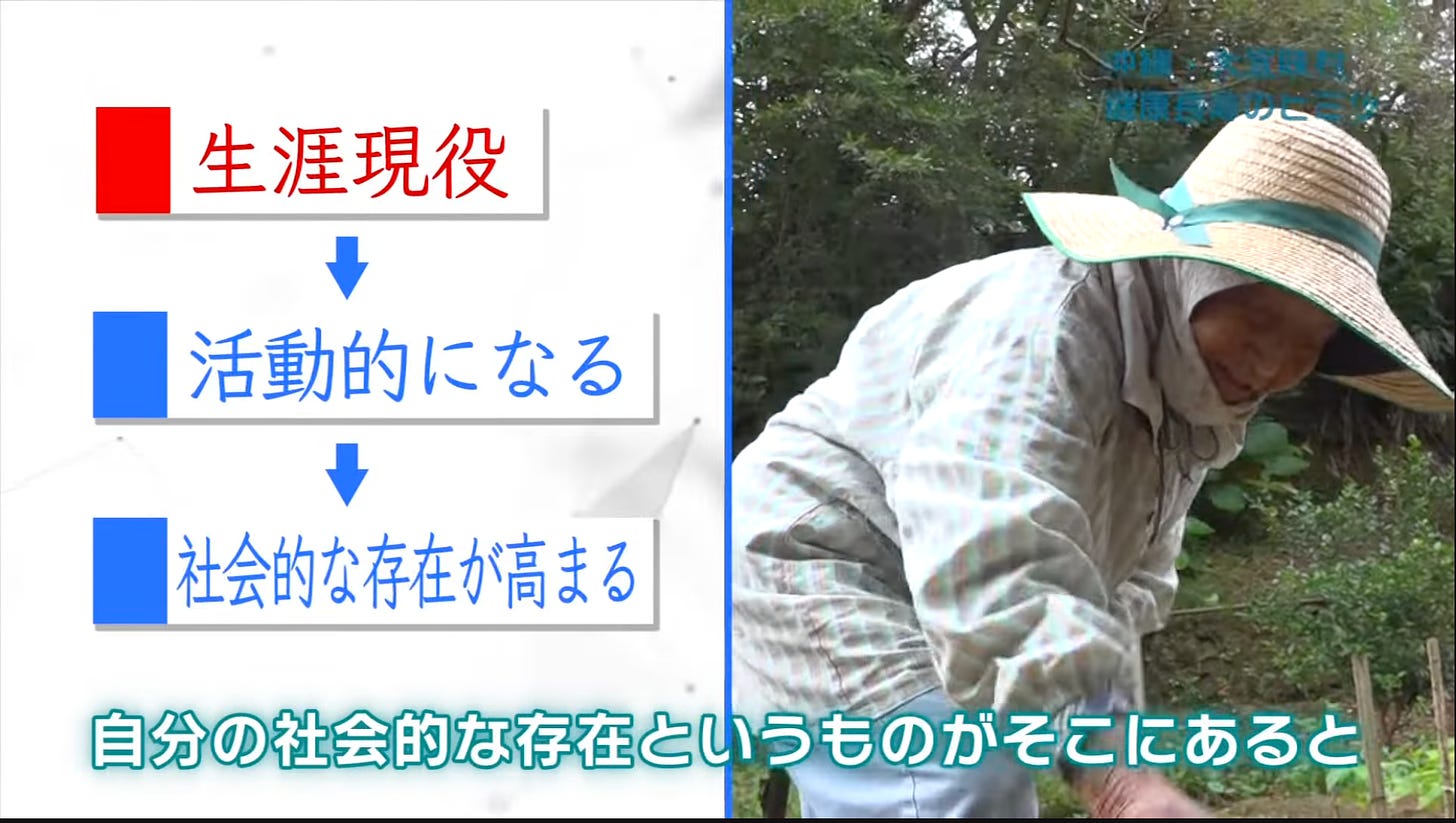 </figure>
</figure>Also, having a role usually means you need to be active. If one of the things Chiyo-san’s community relies on her for is supplying everyone with the citrus fruit shīkwāsa, then being active isn’t just something she has to do to be healthy, being healthy becomes a necessary component of fulfilling her goal of contributing to the community.
The program also talks about the grave ills that loneliness can bring, saying that being lonely is probably worse than smoking.
<figure>Buying cigarettes at the corner store in Oogimi.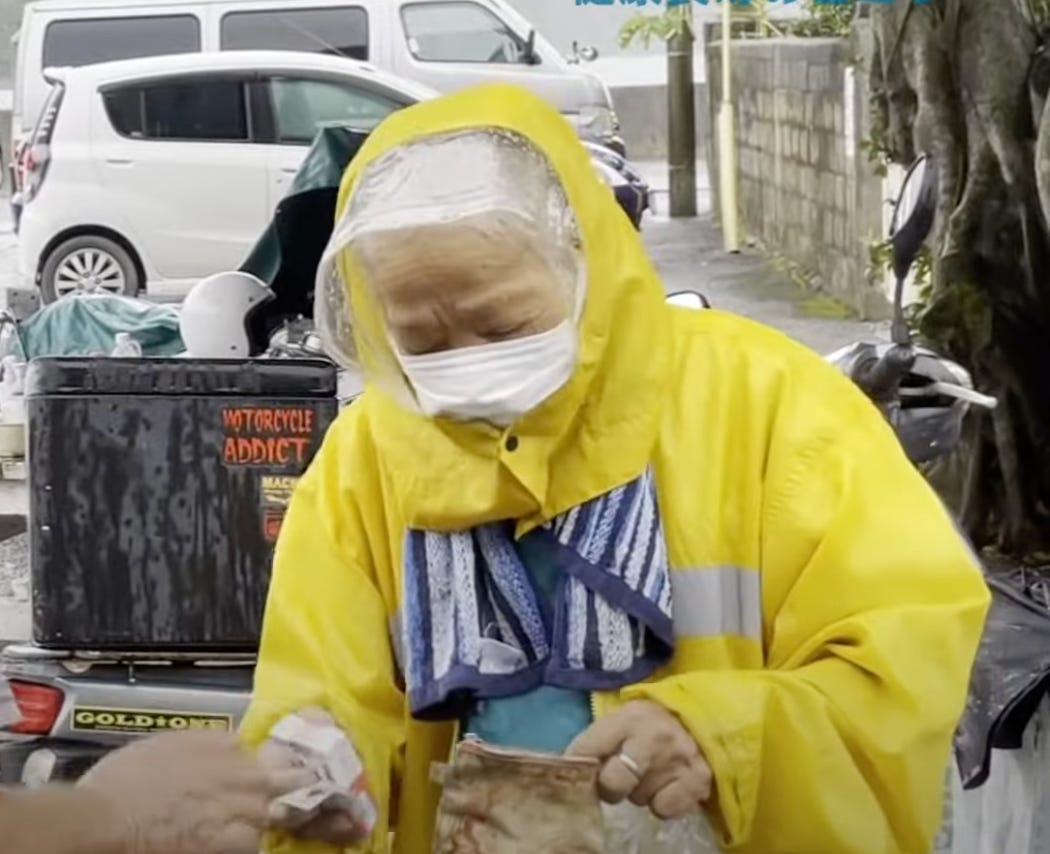 </figure>
</figure>In a TED talk, Robert Waldinger presents the results from the Harvard Study of Adult Development that tracked the lives of men since 1938. What lessons come from the tens of thousands of pages of information on their lifestyles, blood markers, brain scans and so on?
“The clearest message that we get from this 75 year study is this: Good relationships keep us happy and healthy. Period. …Social connections are really good for us and loneliness kills.”
At least some of the people of Oogimi apparently engage in ‘unhealthy’ habits like hanging out and drinking until late at night, but it’s in service of a greater goal: strengthening the community.
By the way, the program didn’t say how much they drink, I really doubt they’re having binge drinking frat parties.
<figure>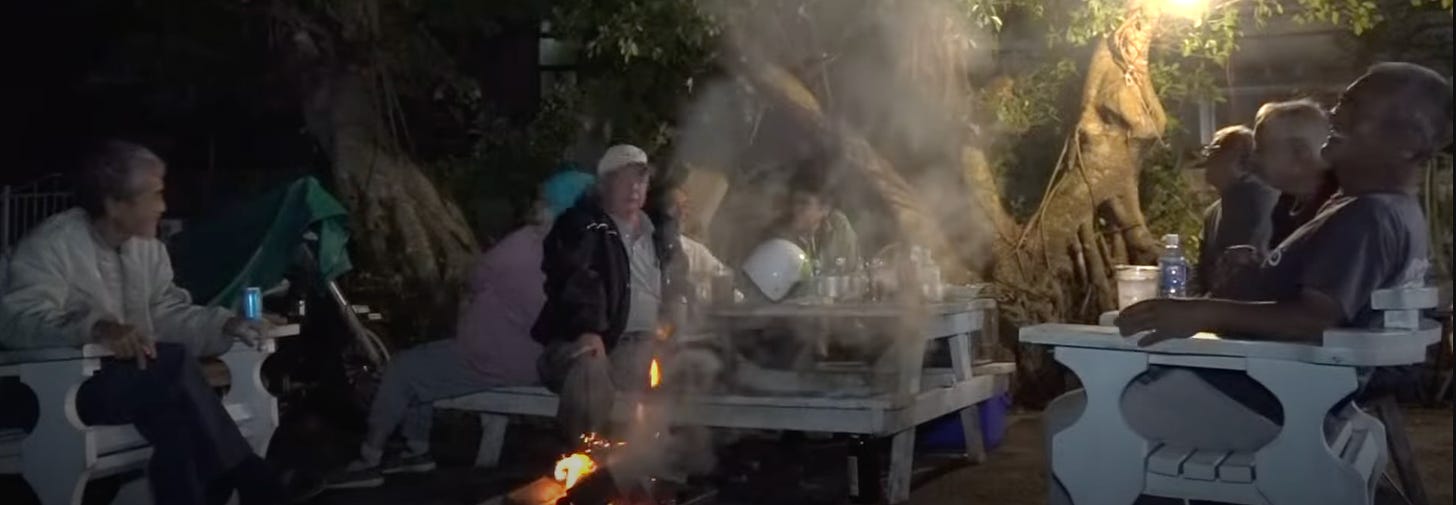 </figure>
</figure>Lastly, I’d bet living on a beautiful, peaceful island helps a lot with stress reduction.
<figure></figure>
